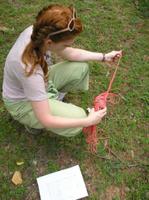Compassion Trip: Journal
Wednesday, October 19, 2005
Tuesday, October 18, 2005
It's STARTING!

High Five for our first day on site!!!
We marked our column grid today and started clearing the vegetation; by Friday the excavation should be finished. Tomorrow we hope to hear back from the structural engineer (official, I know. We don't mess around.) and then we can start buying materials. The masons have been lined up and are awaiting the green light to pour the foundation.
It's a happy day.
Sunday, October 16, 2005
The 12-Legged Monster
It was so awful! I can't even describe how terrifying this creature was: body of a cockroach, hairy legs of a tarantula, and pinchers of a scorpion. That terrible spawn of the insect world has given me nightmares for three days!Flying bugs the size of my arm and huge snakes moving a lawn gnome through our hut...yes, a lawn gnome. Don't ask.
Geography Lesson
Having no television, computer, phone, or schoolwork has afforded us the opportunity to catch up on a lot of reading! We've spent several afternoons at the architect's office researching building techniques, but I decided to do some sociological studies as well. I found a great biography about a Tamil woman in an agricultural caste (the Dalits, or 'the oppressed'). Viramma lived her whole life very near where we are living and it has provided me some invaluable insight about the women we will be building for.Like so many women, she was married as a child (11 years old!) and has lived since puberty in the village where her husband was born. She has had 12 children and every day of 50+ years of marriage has been spent in the rice paddy fields, up to her knees in mud with the scorching sun on her back. In the evenings, women start the fire, go to the market, and return to make the evening meal and do the housework.
The Dalit caste is considered impure (and 'untouchable') by the Hindu religion (for reasons far too complicated to delve into here). Their presence is considered polluting to anyone of a higher status and therefore they were not historically allowed in temples, parts of the village, or homes with members of a higher caste. Objects they have used are also considered unclean, so they may not use glasses at the teashops.
Though officially Untouchability has been abolished (and the former term 'Pariah' or untouchable replaced with the politically correct term 'Dalit'), the discrimination remains. The government has done a lot to help them advance: installing clean taps at the village wells, providing childcare and education, as well as women's associations. Still, many (including Viramma's generation of "Untouchables" themselves) think it is disrespectful for them to walk, talk, and dress like those in higher castes.
It is astonishing to think of what it must be like as woman of such low standing. Not only the backbreaking work they endure their entire lives, but the self-image that results from having to answer to one's husband, mother-in-law, and land-owning master. The self-help groups which Palmyra has already established (some 40 of them) give these women the skills, confidence, and resources to create lending organizations; they stand to finally end the cycle debt and poverty and gain a dignified place in society.


